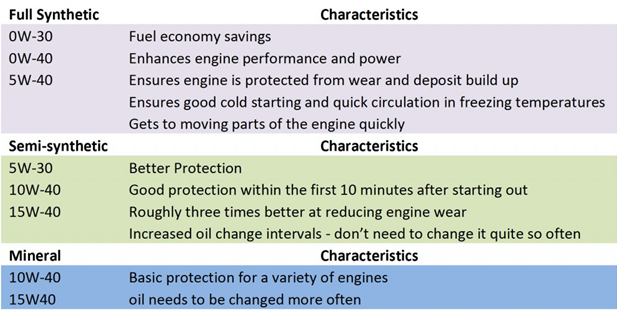How much do you value the engine in your car? The life of your engine depends in no small part on the quality of the oil you put in it – oil is its lifeblood. People typically don’t pay much attention to their oil – after all oil is oil, right?
What does my oil actually do?
Engine oil performs many functions.
• It prevents metal to metal contact, saves them from grinding together and tearing themselves apart from friction
• Transfers heat away from the combustion cycle.
• Engine oil also holds in suspension all the nasty by-products of combustion like silica (silicon oxide) and acids.
• Finally, engine oil minimizes the exposure to oxygen and thus oxidation at higher temperatures. It does all of these things under tremendous heat and pressure.
What does ‘5W40′ mean?
As oils heat up, they generally get thinner. Single grade oils get too thin when hot for most modern engines which is where multigrade oil comes in. The idea is simple – use science and physics to prevent the base oil from getting too thin when it gets hot. The number before the ‘W’ is the ‘cold’ viscosity rating of the oil, and the number after the ‘W’ is the ‘hot’ viscosity rating. So a 5W40 oil is one that behaves like a 5-rated single grade oil when cold, but doesn’t thin any more than a 40-rated single grade oil when hot. The lower the ‘winter’ number (hence the ‘W’), the easier the engine will turn over when starting in cold climates.
A quick glance to different grades of oil
MINERAL / SYNTHETIC oil?
Mineral oils are based on oil that comes from dear old Mother Earth which has been refined. Synthetic oils are mostly concocted by chemists wearing white lab coats in oil company laboratories. The only other type is semi-synthetic, sometimes called premium, which is a blend of the two. It is safe to mix the different types, but it’s wiser to switch completely to a new type rather than mixing.
Flushing oil
These are special compound oils that are very, very thin. They almost have the consistency of tap water both when cold and hot. Typically they are 0W/20 oils. Their purpose is for cleaning out all the gunk which builds up inside an engine.
Do I need flushing oil?
Unless there’s something seriously wrong with an engine, like it’s been filled it with milk or shampoo, there is not normally a need for a flushing oil. If you do decide to do an oil flush, there’s two ways of doing it. You can either use a dedicated flushing oil, or a flushing additive in your existing oil. Either way it’s wise to change the filter first so you have a clean one to collect all the gunk. (This typically means draining the oil or working fast). Once you have a new filter in place, and the flushing oil (or flushing solution) in there, run the engine at a fast idle for about 20 minutes. Finally, drain all this off (and marvel at the crap that comes out with it), replace the oil filter again, refill with a good synthetic oil and voila! Clean(er) engine. For the curious amongst you, looking in the oil filter that was attached when you did the flush will be an educational exercise in the sort of debris that used to be in your engine.
Stay Tuned.
Pitcrew Team
Pitcrew is a Car Servicing Startup in India. Book a car service from authorized service centers or a fulfilled by Pitcrew network online or through our mobile app
Website: www.pitcrew.co.in
Download App: www.pitcrew.co.in/app
Call: 9069006420






ԝhoah this webⅼog is excellent i really like reading your
articles. Stay up the good work! You already know, a lot of
persons aгe looking around for this info, you can heⅼp them greatly.